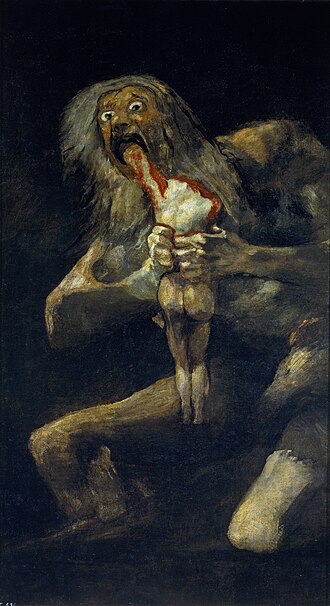The story of Cronus is a fantastic example of the pagan view of Son-ship and Fatherhood. Before Cronos devours his children, he betrays his father, Uranus, at his mother's request.
Then it is this same father ("starry Heaven") that prophesies that Cronos's own son will usurp him. In seeking to prevent this, Cronos devours all of his children.
Although there is an element of justice presented as the motivation for Cronos castrating his father, from the beginning Cronos is described as "wily" and hating his father. If we heavily anthropomorphize, the pretense of justice appears to be a convenient excuse for expressing his hatred. One gets the sense of retribution and vengeance more than justice.
Several interesting themes emerge from this story. First, the vengeful indifference of Cronos both to Uranus and his Children is emblematic of him being the god of time. Second, both Cronos and Zeus play the role of usurping sons, while Uranus and Cronos play the roles of tyrannical fathers. Third, tied to the second, is how the Greek expression of power is evident in this mythological depiction.
Uranus, the god of the starry Heavens, fathers Cronos, the god of Time, much like how time seems to emerge from the heavens. Subsequently, Cronos fathers Zeus, the god of Order, among other things. Eventually, Zeus locks up Cronos, in the same way that the chaos of time is controlled by means of order.
Conceptually, since each god represents a particular power, we can see themes of how they interact. The starry heavens are changed, and are spilled out by time. Despite time emerging from the ether of the universe, the universe itself becomes subject to it. Poetically, time itself is subject to its own chaos, its own effort to thwart its usurpation becomes powerless against the force of order. This order, though unable to completely destroy time, binds it and locks it away, along with all the titanic forces.
Aside from the cosmic significance, there's also a depiction of how fathers and sons interact with each-other. Cronos hates his father and aims to harm, if not to destroy, him. Then, in the same way and by the same means, he anticipates that his son will usurp him. The myth does not say precisely what motivates Cronos' desire to prevent his fate, but we might be able to relate. The march of time, passing for us all, reminds us of our impending doom, and many foolish attempt to postpone it indefinitely. Proving that we are stronger, or more beautiful, or more intelligent than the young is often the coping strategy of those who are dying. If we can only prove our strengths over others, then reality has vindicated that we may never die. How shameful of us to believe this. How needlessly destructive for us to act on it, as if we truly gain in the destruction of another.
For the Greeks, and most of the ancient world, this power obsession was not uncommon. Notice, although Uranus is called sinful for his early behavior, the acts of overpowering their fathers by both Cronos and Zeus is not described in the same terms. In fact, it is barely given any moral weight, it is simply depicted as the way things are. We might not realize how shocking this neutrality is if we do not attempt to visualize the complete barbarity that Cronos undertakes. It is easy to pass the castration and the cannibalism as quirks of ancient mythology. However, this is where the artists are helpful, so that we are without excuse, and are visually confronted with the horror of what we read. Goya's depiction of Saturn (Cronos) devouring his son gives an unparalled sense of the terror involved in the act.

When we consider the full breadth of this mythology, and our personal experience as parents and children, we are left with a bleak reality, if the story is normative on any grounds. The empty indifference of cosmic forces leaves us with little hope. Our lust for power and preserving our life, leads us to deeper horrors. We, as fathers and mothers, far too readily cannibalize our children in the name of our own self-glorification. We as children far too readily despise our parents on the basis of their sins. The myth, rather than inspiring, condemns us.
However, there is another example that provides an alternative. The Greek myths reached the end of what power could provide, a callus indifferent world destined for violence. Yet, it could not predict the next step that would overturn Zeus and his order. Time overturned the heavens, and order overthrew time, but it was the violence emblematic of that age in-which Christ endured the cross. The ubiquity of that violence became the very means by which it was overturned. It is in His salvation that the deepest substrates of the ancient world are renewed. We no longer fixate on mortal dread, for Christ has overcome death. We no longer dwell on desired power, for Christ has been given all power in setting it aside. And, perhaps most tangibly, we are given an example of how parents might be reconciled to their children. We see in the story of Christ, a son who submits to his father, even to the point of death on a cross, and a father who is pleased by and glorifies the son. In Christ we have a final answer to this unfinished mythology, and that is good news.